🎨【DELF B2 】What Are “Droits D’Auteur”?|Learning French Through Real Topics
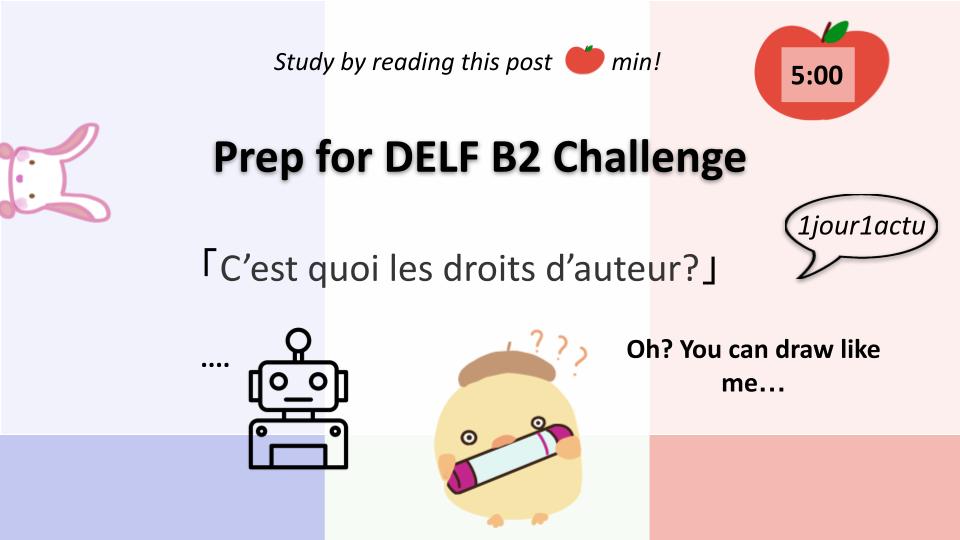
This post is 5 minutes read time. Aiming for studying by just reading!
My DELF B2 Preparation Blog – Listening & Writing Practice
Learning French Through Real Topics: C’est quoi les droits d’auteur?– 1jour1actu
In the digital era where music, videos, and images are shared instantly, the idea of “droits d’auteur” (copyrights) has become more complex – especially with A.I. tools. This article from 1jour1actu introduces the concept of copyright and raises timely questions about A.I.-generated content. A great topic for B2 learners to explore argumentation and legal vocabulary!
📌Today’s Key Sentence|Let’s read and understand the original
Pour bénéficier de cette protection, l’œuvre doit être originale, c’est-à-dire porter la marque de la personnalité de l’auteur.
Translation 👉 :
To benefit from this protection, the work must be original, meaning it must bear the mark of the author’s personality.
🔍 Vocabulary & Grammar Breakdown
| French | Translation | Explanation |
|---|---|---|
| Pour bénéficier de | In order to benefit from | “pour” + infinitive = expresses purpose |
| cette protection | this protection | “protection” = legal protection (context: copyright) |
| l’œuvre doit être | the work must be | “devoir” in present = necessity |
| originale | original | Must show personal uniqueness |
| c’est-à-dire | that is to say / in other words | Used to explain/rephrase |
| porter la marque de | bear the mark of | Idiomatic phrase meaning “show the influence/signature of” |
| la personnalité de l’auteur | the author’s personality | Highlights originality criterion |
📚Vocabulary Boost
| Expression | Meaning | Notes |
|---|---|---|
| les droits d’auteur | copyright | Literally “the rights of the author” |
| œuvre intellectuelle | intellectual work | Includes music, software, writing, etc. |
| vendre | to sell | In context: selling someone else’s work illegally |
| originale | original | Needed to receive copyright protection |
| une IA (intelligence artificielle) | an A.I. | Common in debates about authorship |
| plein de | lots of / many | Informal; used to express quantity casually |
| s’approprier | to take over / to claim for oneself | Often used negatively (e.g. theft of style) |
| se faire connaître | to become known | Often used in social media or art contexts |
| tirer profit de | to profit from | Used in financial or ethical discussions |
| véritable | true / real / genuine | Often used to distinguish real from fake or superficial |
| tiens | look! / hey! / here you go! | Interjection to express surprise or call attention |
🎁 Bonus|How to Use “tiens” in French
The word tiens is a common interjection in French, often used in spoken language to express surprise, draw attention, or offer something. While it’s informal, it’s very useful to understand – especially if you’re aiming for real-life fluency or interpreting dialogue in texts.
1. To express surprise or sudden realization
🔧 Structure: Tiens + phrase or noun
Meaning: Wow! / Oh! / Hey!
✅ Example:
Tiens, cette IA a reproduit mon style sans me demander !
Wow, this AI copied my style without asking!
2. To draw someone’s attention
Meaning: Look! / Check this out!
✅ Example:
Tiens, regarde ce dessin : il ressemble beaucoup au tien.
Hey, look at this drawing — it really looks like yours.
3. Should you use tiens in writing?
- Tiens is very colloquial, so it’s mostly used in spoken French or dialogue.
- For DELF B2 writing, avoid using it in formal essays, but it can be acceptable in emails, letters, or fictional conversations.
🔧 Grammar Focus | Key Structures for B2
Structure: pour + infinitif + complément
Meaning: expresses purpose
Use in writing: Very common in formal texts, scientific reports, and passive constructions.
✅ Pour bénéficier de cette protection…
➝ In order to benefit from this protection…
Structure: c’est-à-dire
Meaning: that is to say / in other words
Use in writing: Clarifies or reformulates the previous statement
✅ Elle est musicienne, c’est-à-dire qu’elle compose et interprète ses propres morceaux.
➝ She is a musician, meaning she writes and performs her own songs.
Structure: Porter la marque de
Meaning: to carry / bear a mark
Use in writing: Used figuratively to indicate expression or influence。
✅ Ce roman porte la marque de son auteur.
➝ This novel bears the mark of its author.
📘 Essay Expressions | Ready-to-Use Phrases
| French Expression | Example in French | English Translation |
|---|---|---|
| Il est essentiel de protéger… | Il est essentiel de protéger les droits des artistes. | It is essential to protect artists’ rights. |
| Cela pose la question de… | Cela pose la question de la propriété intellectuelle. | This raises the question of intellectual property. |
| On doit définir clairement… | On doit définir clairement la limite entre l’inspiration et la copie. | We must clearly define the boundary between inspiration and copying. |
🖋️ Practice Writing | Short Essay Prompt
Sujet : Penses-tu que les œuvres créées par l’intelligence artificielle devraient être protégées par des droits d’auteur?Pourquoi?
(Do you think A.I.-generated works should be protected by copyright? Why?)
✍️ Model Answer (DELF B2 style):
🟦 Introduction
Aujourd’hui, l’intelligence artificielle peut créer des œuvres impressionnantes : des dessins, des musiques, ou même des livres. Cela pose une question importante : qui détient les droits d’auteur ?🟩 Argument 1
D’un côté, l’IA utilise des œuvres humaines pour apprendre. Ainsi, il est normal de protéger les artistes originaux contre la copie.🟥 Argument 2
D’un autre côté, certaines œuvres créées par IA sont originales et uniques. Dans ce cas, il est difficile de décider à qui appartiennent les droits.🟨 Conclusion
À mon avis, il faut créer de nouvelles lois pour définir clairement les droits d’auteur dans le cas des IA. Cela protégera les créateurs tout en permettant l’innovation.
Translation:
🟦 Introduction
Today, A.I. can create impressive works: drawings, music, or even books. This raises an important question: who owns the copyright?
🟩 Argument 1
On one hand, A.I. uses human works to learn. So it’s logical to protect original artists from being copied.
🟥 Argument 2
On the other hand, some A.I.-created works are original and unique. In this case, it’s hard to decide who owns the rights.
🟨 Conclusion
In my opinion, we need new laws to clearly define copyright in the case of A.I. This will protect creators while encouraging innovation.
✅ Test Yourself | Final Quiz
Q1. Which expression means “to benefit from”?
a) porter la marque
b) bénéficier de
c) se faire connaître
Q2. Which word means “to sell” in French?
a) vendre
b) voler
c) offrir
Q3. What does “se faire connaître” mean?
a) to recognize someone
b) to become known
c) to be copied
Answer
Q1. a) a sample
Q2. c) lors de
Q3. b) To ensure the preservation of the oceans
Q1. b) bénéficier de
Q2. a) vendre
Q3. b) to become known
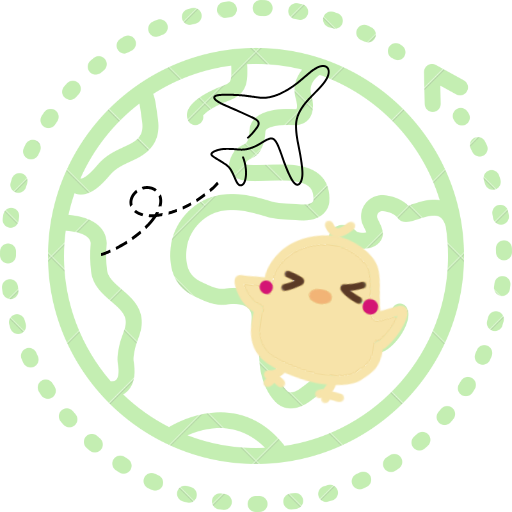

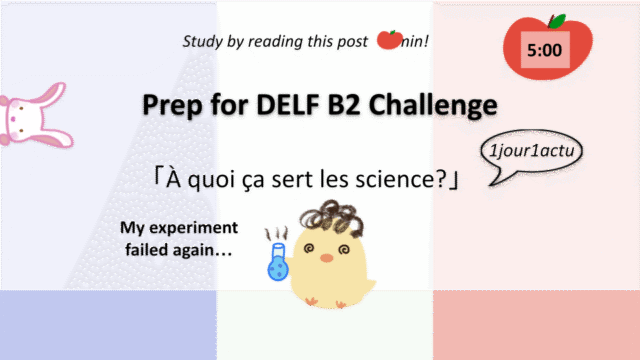
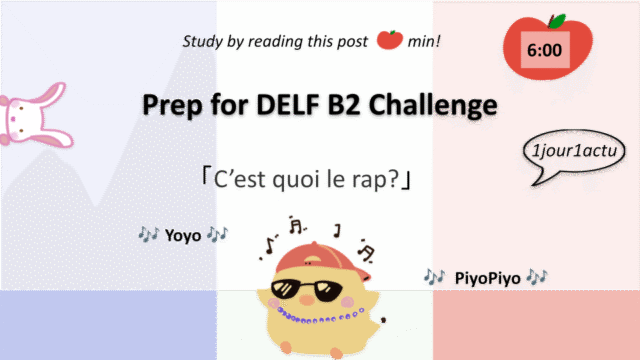
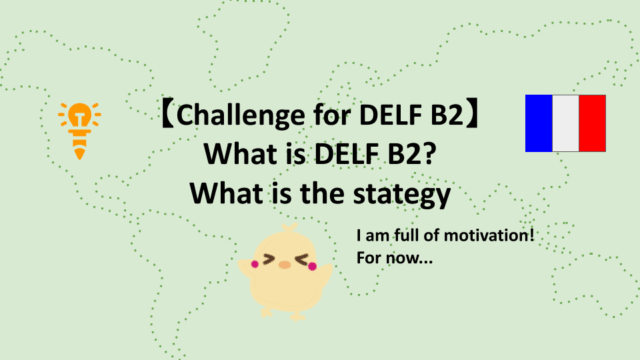
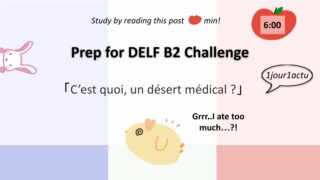



Leave a Reply